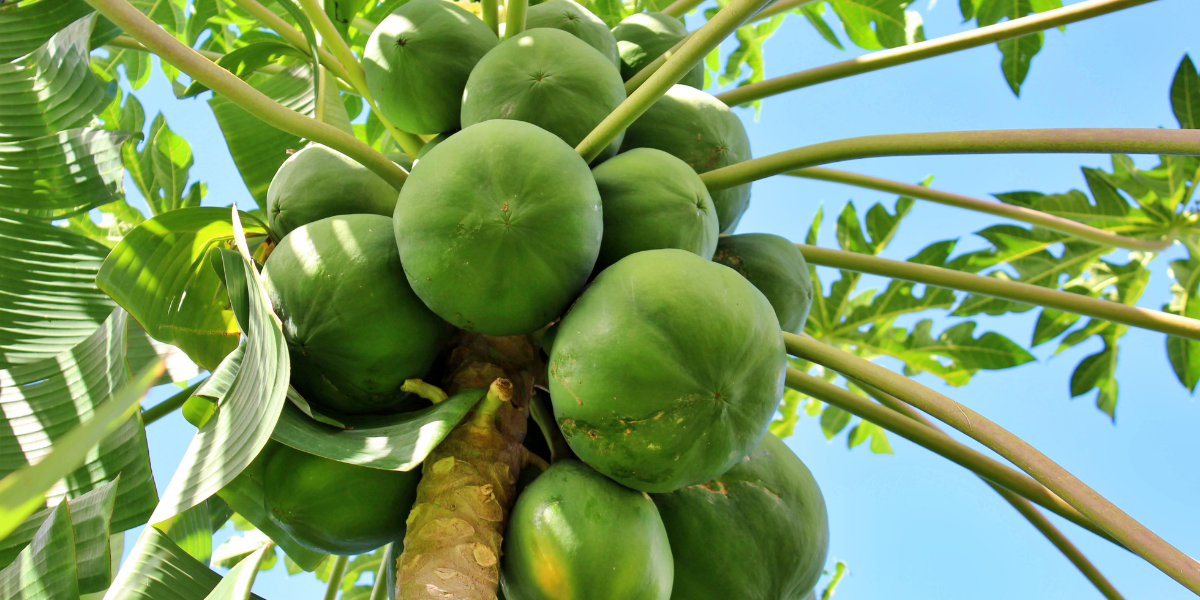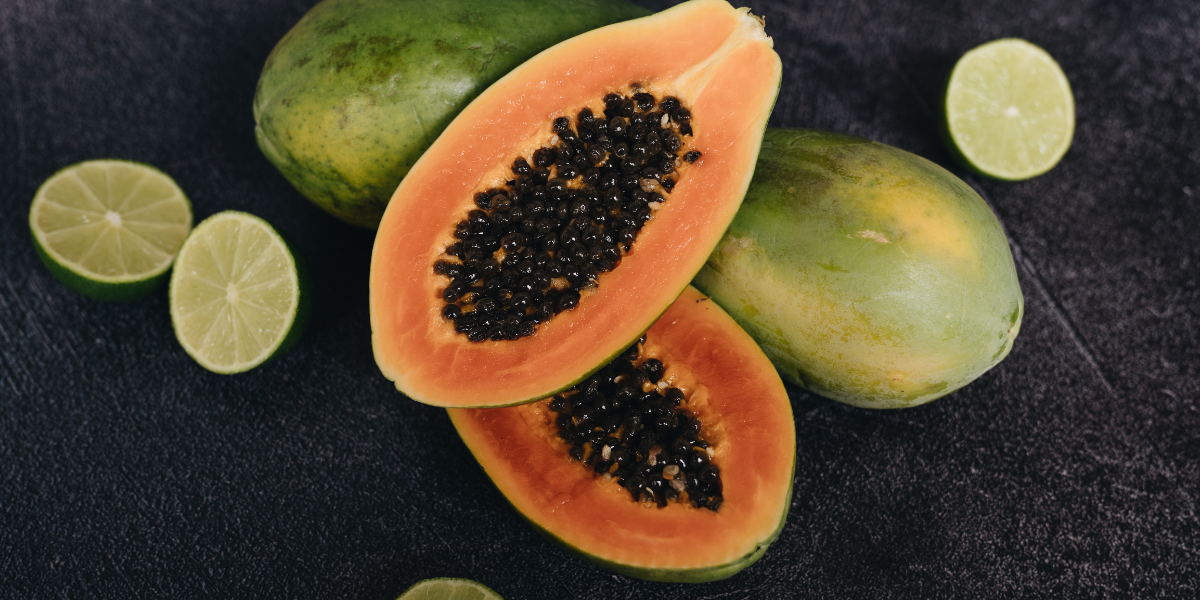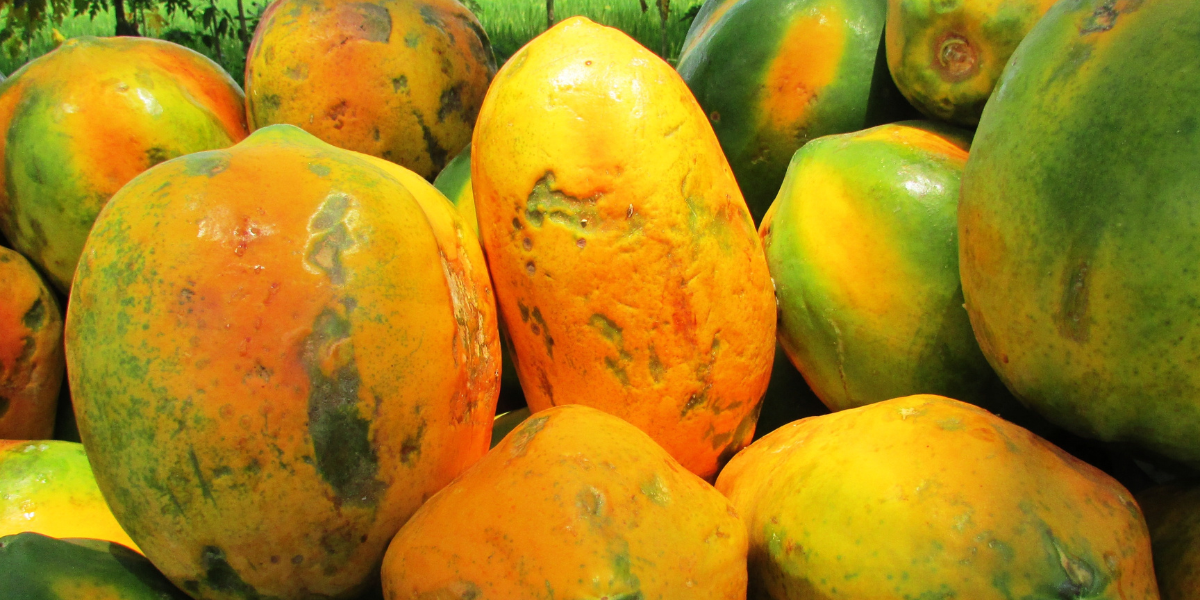Papaya is a soft, fleshy fruit with a sweet taste and vibrant color that is used in a wide variety of ways. It can be a delicious addition to smoothies, salads, and other dishes. In addition, papayas offer certain health benefits –not just in their fruit, but also in their seeds! Are papaya seeds for constipation treatment? Read more to find out!
Papaya: Background Info

Papaya (Carica papaya) is said to have originated from Central America and made its first appearance in the Dominican Republic, Mexico, and Panama in the early 16th century. It was not until 1550 that the plant was introduced to Southeast Asia when Spanish explorers brought some seeds to the Philippines. The Portuguese and the Spaniards then advanced the plant in the adjoining Malay Peninsula and the East Indies. Nowadays, papaya can be found in most tropical regions where it thrives in the warm climate.
There are 2 major types of papayas, Hawaiian and Mexican. The Hawaiian type is the one generally found in grocery stores and supermarkets. They are pear-shaped, have yellow skin when ripe, and generally weigh about 1 pound each.
On the other hand, Mexican papayas are a lot bigger than the Hawaiian variety, may weigh as much as 10 pounds, and measure more than 15 inches in length. Mexican papayas are also less sweet than their Hawaiian counterpart but taste delicious just the same. They are also somewhat easier to cultivate compared to Hawaiian papayas.
According to the results of a 2017 study done by the University of Florida, papaya seeds are an abundant source of nutrients. They contain crude fiber, protein, folate, vitamins A and C, minerals like calcium, phosphorus, magnesium, zinc, and iron, as well as flavonoids and polyphenols that are powerful antioxidants. Moreover, the oil in papaya seeds is also rich in monounsaturated fatty acids.

With papaya seeds being a formidable powerhouse of nutrients, it is no wonder that they also offer an impressive array of health benefits such as:
- Strengthens the immune system
- Detoxifies the liver
- Has powerful antioxidant properties
- Has antibacterial and anti-inflammatory properties
- Reduces cancer risk
- Promotes kidney health
- Maintains gut health
- Improves heart health
- Lowers blood sugar and cholesterol levels
- Helps in weight loss
- Helps control dandruff
- Improves skin appearance
- Supports dengue and malaria treatment
Papaya Seeds For Constipation: Does It Work?
In the United States, constipation is common for about 16 in 100 adults. Constipation is the condition when an individual has difficulty passing stool or has reduced bowel movements. You may be constipated if you have less than 3 bowel movements per week.
Fortunately, consuming certain foods can help to alleviate and prevent constipation. One of these is papaya. Do papaya seeds for constipation work? There are several reasons why this treatment may be effective.
-
Papaya seeds are high in fiber.

Papaya seeds have considerable amounts of soluble dietary fiber. One of these is pectin which helps to draw water into the intestines as well as absorb fluids. This way, the stool is softened to prevent constipation.
According to a 2014 study conducted in China, pectin can speed up bowel movement and help relieve symptoms of constipation. The study involved 80 patients suffering from constipation. Some of the participants were given pectin supplementation at 24 grams per day for 4 weeks, while the rest were given a placebo. Results after the trial revealed that the intestinal transit time and symptoms of constipation were considerably lessened on the part of those who were given pectin compared to those who had the placebo.
-
Papaya seeds contain papain.
Papaya has a natural digestive enzyme known as ‘papain’ that hampers the growth of harmful gut bacteria and encourages proper bowel movement. Papain is most effective in unripe papayas.
Papain is one of the most effective natural substances for breaking down undigested protein in the gut. The simple act of eating a small number of papaya seeds along with a meaty meal is enough to enhance protein digestion and prevent gas and constipation.
-
Papaya seeds relieve flatulence.
Papaya seeds are carminative in nature, which means that they help expel gas from the stomach to alleviate flatulence, distention, and abdominal pain.
Other foods that are considered to be carminative are lemon, ginger, garlic, nutmeg, and herbs like sage, peppermint, cloves, basil, and thyme. Carminative herbs are used to spice up starchy dishes, particularly those containing beans because they help you burp and pass gas more easily.
-
Papayas are a good source of prebiotics.

Prebiotics are a kind of fiber that serves as food for the beneficial bacteria that live in our gut. Prebiotics enable these good bacteria to grow and flourish and help maintain a healthy balance of microorganisms in the gastrointestinal tract.
Papaya is one of the best fruits you can eat for optimum gut health because it has plenty of beneficial digestive enzymes. They calm the stomach and help with the assimilation of proteins and fats. These fruits assist in minimizing harmful gut bacteria and are an excellent source of prebiotics.
-
Papayas have laxative properties.
Papayas, just like oranges and plums, are excellent natural laxatives in treating constipation even when you have a chronic history of this condition. These fruits are high in fiber and water content which speed up the intestinal passage and help in stool formation.
Papaya can be eaten in the evening as it serves as a laxative that cleans the colon. Nonetheless, it should be consumed no less than 4 to 5 hours after meals. So if you desire to have papaya at night, better make sure to adjust your dinnertime accordingly.
Contradictory Findings

However, eating raw papayas can also cause constipation. When eaten in the proper amount, papaya can be good for digestion. However, when over-consumption occurs, the high fiber content in raw papaya may lead to gas, bloating, and constipation. These symptoms may be relieved by increased fluid intake, dietary changes, and exercise.
Papayas are an excellent source of both soluble and insoluble fiber. They are high in soluble fiber which is good for both constipation and diarrhea, but they also contain insoluble fiber which can aggravate clinical findings of constipation and abdominal pain.
What To Watch Out For

Although they are chock-full of health benefits, particularly in treating constipation, papaya seeds can also go the extreme route and cause diarrhea. Papaya seeds contain benzyl glucosinolate which is produced in the papaya pulp and stored in the seeds after the fruit ripens. Benzyl glucosinolate can have toxic effects and excessive consumption of papaya seeds can result in food poisoning as manifested by abdominal cramps, nausea, vomiting, fever, and diarrhea.
Aside from food poisoning, over-consumption of papaya seeds may increase the chances of miscarriage and decrease sperm count in men. To prevent these side effects, you should not eat more than 1 teaspoon of papaya seeds per day. Papaya seeds are also not recommended for breastfeeding mothers and people with kidney stones, hypoglycemia, allergies, and stomach ailments.
Sum And Substance

Over-consumption of papaya seeds can be easily prevented simply by sticking to the recommended daily serving. Papaya seeds are surprisingly nutritious and they have been associated with a number of health benefits such as heart protection, cancer prevention, and many more.
So the next time you indulge in papaya, make sure to consume both the flesh and the seeds in order to enjoy its full range of health benefits. Are papaya seeds for constipation treatment? They surely are!

